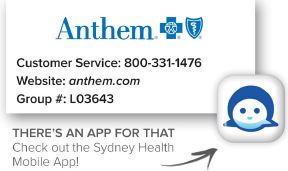The Flexible Spending Accounts (FSA) is administered by Anthem. FSAs allow you to save money by paying certain health and dependent care expenses on a pre-tax basis. You pay no taxes on the money you put in these accounts, which means more take-home pay for you.
An FSA lets you set money aside from your paycheck before it’s taxed, in a special account to pay for eligible medical expenses during your plan year. You’ll also get your own health care debit card for immediate access to your FSA funds.
You may contribute up to $3,050 (2024) per calendar year (annually) to pay for out-of-pocket medical, prescription drug, dental, and vision care expenses for yourself and your eligible family members — even if you do not cover your family members under the Wooster health care plans.
You can use the FSA to pay expenses like medical and dental plan deductibles and copays; orthodontia expenses not covered by your dental plan, prescription drugs, prescription glasses and contact lenses, and laser eye surgery.
You are not eligible for the Health Care FSA if you have the Health Savings Account (HSA).
This FSA lets you set aside pre-tax money to pay for eligible dependent care expenses for children up to age 13, and eldercare expenses, so that you — and your spouse, if you are married — can work. You may contribute up to $5,000 per calendar year ($2,500 if married and filing as single).
This account is for those enrolled in the High Deductible Health Plan (HDHP), and may be used for qualified dental and vision expenses only. You may contribute up to $3,050 per calendar year.
If you elect…
PPO Plan
You may elect one or both of the following:
1. Health Care FSA
2. Dependent Care FSA
If you elect…
High Deductible Health Plan (HDHP)
You may elect the following:
– HSA (without FSA)
You may additionally elect:
– Limited Purpose FSA (If you elect the HSA: Used for Dental & Vision Only)
Dependent Care FSA
If 55 years or over, you may additionally elect:
– HSA Catch-Up
If you…
Decline Medical
You may elect one or both of the following:
1. Health Care FSA
2. Dependent Care FSA
How the Dependent Care FSA works:
During enrollment, estimate your annual out-of-pocket dependent day care expenses. This is your annual contribution to your Dependent Day Care Flexible Spending Account. The IRS allows a maximum of $5,000 for your annual contribution.
Divide your annual contribution by the number of paychecks you receive annually. This is how much money will be deducted from each paycheck and placed in your Dependent Day Care Flexible Spending Account. Remember, you’re saving money because no taxes are taken out of your contributions.
Health Care FSA Rollover:
With re-enrollment, you may carry over up to $610 of unused health care FSA funds from one plan year to the next, but any funds above $610 will be forfeited if you do not spend them on expenses you incur during the plan year. You will have 90 days after the end of the plan year to submit reimbursement requests. If you enroll in the HDHP, your funds will roll over into the Limited Purpose FSA. Rollover amounts are determined by the IRS year to year. The maximum 2023 FSA rollover amount is $610.
Flexible Spending Accounts (FSA) Debit Card

Debit cards will be issued to new enrollees. You can use your card to access your FSA funds for eligible expenses. This card works like a bank debit card — just swipe it when you make your purchase and the money will automatically be deducted from your account. You may be asked to document your FSA expenses, so be sure to save your receipts!
Note: A prescription is no longer required for over-the-counter drugs that alleviate or treat injuries or sickness. In addition, menstrual care products are now eligible expenses.
